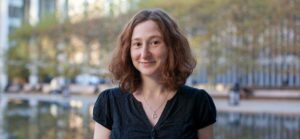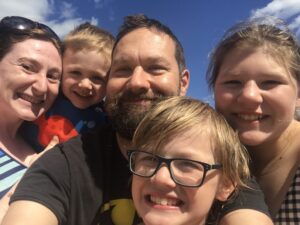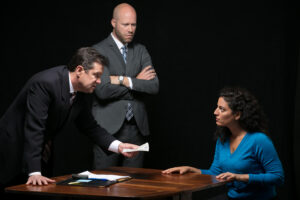Meet Cat Miller, Later Mom, Playwright and Director, THE HOPE HYPOTHESIS
 Can you share with us your road to parenthood? It was an unexpected one. I always wanted to have kids. When I was 30, my first marriage ended, and I remember being terrified I had missed my chance. Then, just about three years later, my step-kids came into my life, and I went from zero to two kids in an instant. It was really intense and hard, but also infinitely joyful and I am very close to both of them. They live with us half time, and when I told them I was pregnant, my stepdaughter’s first question was “will Mommy accept another child?” We had to explain that this child wouldn’t go back and forth.
Can you share with us your road to parenthood? It was an unexpected one. I always wanted to have kids. When I was 30, my first marriage ended, and I remember being terrified I had missed my chance. Then, just about three years later, my step-kids came into my life, and I went from zero to two kids in an instant. It was really intense and hard, but also infinitely joyful and I am very close to both of them. They live with us half time, and when I told them I was pregnant, my stepdaughter’s first question was “will Mommy accept another child?” We had to explain that this child wouldn’t go back and forth.
It was a scary decision to have my son. We knew we wanted another kid, and there was definitely a sense that the window was closing, but I was still very much building my career, and I was afraid having a baby would derail it. In some ways it did. But it also led me to focus on my writing which led directly to this play and this production. I couldn’t be more grateful for that.
What do you most want to teach your son and two step children? Compassion and empathy. If they learn nothing else from me I hope they learn those.
 What have you learned from them thus far? I think the most important thing I have learned from them is that nothing is a given. Everything is learned. And if that is true, we can choose to teach something else.
What have you learned from them thus far? I think the most important thing I have learned from them is that nothing is a given. Everything is learned. And if that is true, we can choose to teach something else.
How does motherhood impact your work? Certainly financially. Before I had kids, I was a freelance director, and I did fine living gig to gig and traveling to different cities. But the financial resources needed to raise kids, particularly in New York City, are extreme, and it quickly became clear that I needed to make a different choice when I became a mom. I now have two parallel careers. In addition to being a writer-director, I am Vice President of Operations at Resnicow and Associates, an arts communications firm. It has been a challenge figuring out how to balance the two, both in terms of time and how I think and talk about myself, but it has also allowed me to grow in unexpected ways and has led me to be the artist I am today.
Motherhood also, of course, impacts my work creatively. I think most influentially it has caused me to question my assumptions and look at the world not as a given. That has been a huge gift artistically.
What was your inspiration for writing THE HOPE HYPOTHESIS? It was the confluence of two things. First, at the time, a good friend was going through a horrible ordeal with US immigration authorities. Despite being married to an American citizen, she was being denied a green card because she did not have a birth certificate. She didn’t have one because they were not regularly issued where she was born. It’s a very long story, but in the end, in order to get her green card, her father had to fly to the country where she was born, get a meeting with the current mayor of the town she was born in, and get him to issue a formal decree that she had been born there. THAT the U.S. government accepted. Not the reams of legitimate documents she provided mind you, but the word of some guy who had no actual knowledge of the time or place of her birth. In hindsight the absurdity of that is comical, but at the time it was really scary. And during that time I read an article in the New York Times about the strangely comprehensive and functional bureaucracy of ISIS which was discovered when they liberated Raqqa. In the article was a picture of a birth certificate issued by ISIS. I remember thinking, ‘oh my god, what if someone had to deal with US immigration authorities with THAT?’
What do you hope the audience takes away from it? I hope the audience leaves the theater determined to keep choosing hope, even when it feels futile.
Is it challenging to direct a play you have written? In some ways, yes—it can be hard to separate what I imagined a moment to be when I was writing it from how it actually works on stage. But in other ways it is easier. I feel freer directing my own work. I’m not afraid of undermining the playwright’s intent or disappointing them. I can be as bold as I want. I can also change the words when they don’t work. That’s awesome.
Any words of wisdom you would offer to other women contemplating motherhood at age 35 or older? Someone recently asked me what advice I would give young or aspiring playwrights and strangely I think my advice to women contemplating motherhood at 35 or older is basically the same: Listen to yourself. There is no one way to do this thing. Be your own compass.
What do you see as the positives and challenges of motherhood? The greatest positive is being able to rediscover the world again. I remember when I first read Harry Potter in my 20s, what was most profound about the experience was suddenly remembering what it was like to believe that magic could be real. I literally remembered the sensation of sitting at my desk at school looking at my pencil and thinking maybe I could move it with my mind. It was incredible. Being a parent is like that all the time. The world is made new and strange again.
The greatest challenge is resources—time, money, emotional availability—it feels like you never have enough of any of them and that can be really disheartening.
When you became a mom, did you recall any particular words of wisdom your parents might have shared? It wasn’t when right when I became a mom, but more recently I was talking to my mom about the challenges of parenting a pre-teen (my stepdaughter is almost 13 and is in full middle school mode) and she said, “Oh yeah, there were years in there that I didn’t like you. I always loved you, but I didn’t like you for a while. I just pretended I did until it was true again.” That was the best.

Photo by Beowulf Sheehan
William Ragsdale (left), Greg Brostrom (center), and Soraya Broukhim (right) in a scene from Voyage Theater Company’s “The Hope Hypothesis” at the Sheen Center for Thought & Culture 10/25-11/15. for tickets, please visit sheencenter.org/hope and http://voyagetheatercompany.org/
Tags: cat miller, director, family life, immigration, interview, later mom, nyc, off broadway show, parenting, playwright, stepkids, theatre, voyage theater company















